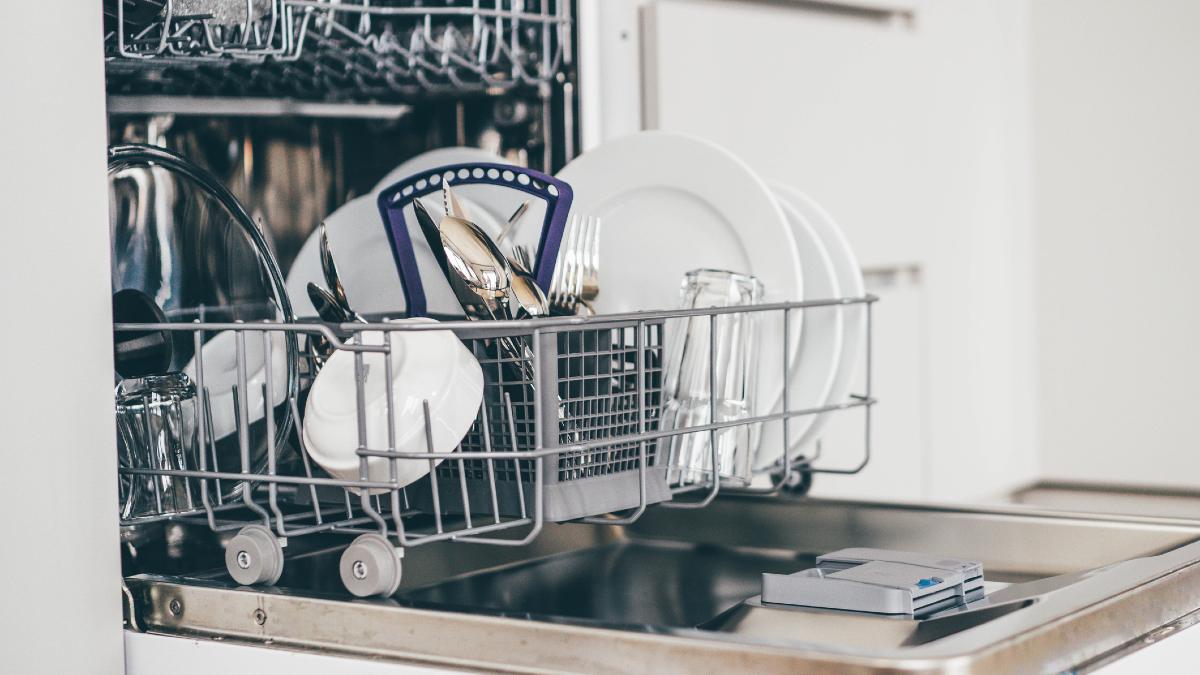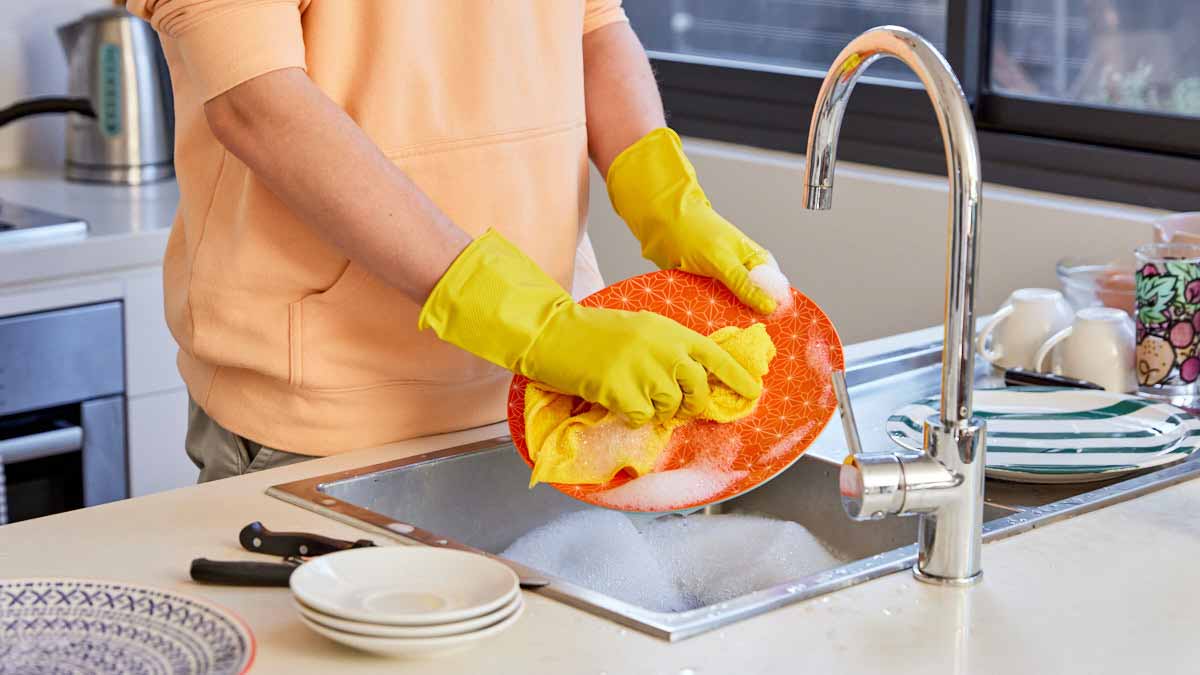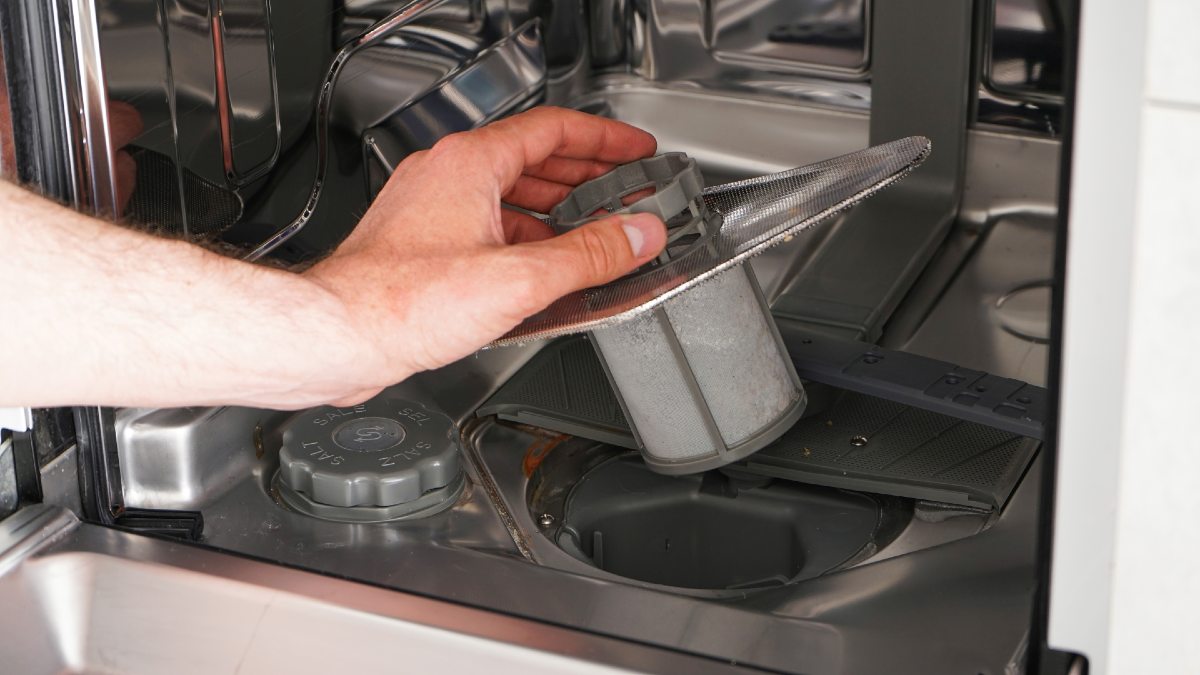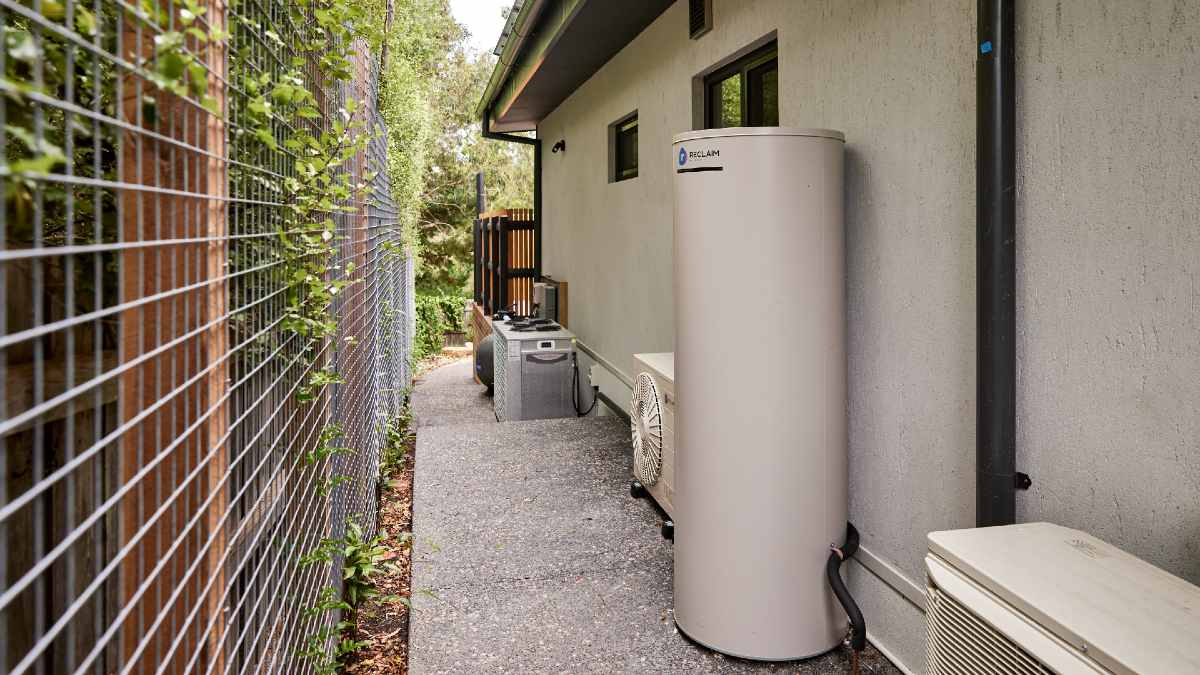Heat pump, vented and condenser clothes dryers all have pros and cons. Here's how to decide what type of tumble dryer is the best for you.
Dishwasher buying guide: how to choose the most efficient dishwasher

A dishwasher can save you time, water and energy if used right. Here’s what to look for when buying an energy and water efficient dishwasher.
Once seen as a luxury, dishwashers are fast becoming essential in Australian kitchens, with Sustainability Victoria reporting one in two Victorian homes now owning the convenient appliance.
Like, washing machines, dryers and refrigerators, a quality dishwasher should last for at least 10 years. Most households use their dishwashers between four and seven times per week, which means you can expect your machine to complete thousands of wash cycles during its lifetime.
Not all cookware is suitable to go in the dishwasher, but using this appliance can help improve water efficiency around the home.
Is using a dishwasher better than handwashing your dishes?
Using a dishwasher is commonly regarded as more water efficient than handwashing.
A standard size dishwasher uses around 10-13L of water per wash. Compare this to a standard size kitchen sink, which commonly have a capacity of about 15-40L. Even if you only fill the sink halfway up, you’re still using more water than the dishwasher, and that’s before accounting for any pre-rinsing or any water wasted while waiting for the water to get hot.
Read more: What not to pour down the kitchen sink
In this article
Dishwasher buying guide Australia 2025
Types of dishwashers
Similar to ovens, dishwashers come in either built-in or freestanding models.
Freestanding dishwashers are great for anyone who moves houses a lot, as they can be transported and installed wherever there is a power supply and water connection, much like a washing machine.
Built-in dishwashers are common in modern kitchens as they generally sit under benchtops for a seamless installation but are usually sold with a property as part of its amenities.
What are benchtop dishwashers and DishDrawers?
As the name suggests, benchtop dishwashers sit on top of your kitchen counter. They are generally the smallest dishwasher type available as well as being portable – good for renters or even for taking camping in a motorhome. Some models need to be plumbed but many can be connected to your kitchen tap via an adapter, with the machines outlet hose draining into the sink.
Unlike a typical dishwasher door that hinges downwards, DishDrawers open outwards, like an ordinary cupboard drawer. They come in either sets of one or two drawers, with the double DishDrawers usually able to run cycles independently of each other.
Looking for advice on home appliances?
Dishwasher efficiency
Energy efficiency
The more energy efficient your dishwasher is, the less it will typically cost to run over the course of its lifetime.
In Australia, dishwashers are included in the government Energy Rating program. This means they must display an energy rating label that clearly shows their star rating and yearly energy consumption.
These labels give consumers a way to quickly compare the energy efficiency of different dishwashers – the more stars on the label, the more energy efficient and the less the appliance costs to run over its lifetime.
Read more: The energy-efficient appliances worth spending money on.
Water efficiency
Dishwashers sold new in Australia should also feature a water rating label.
Like the Energy Rating label, the Water Rating label lets you quickly access and compare your dishwasher's water usage, helping consumers to choose between models based on their water usage.
Sustainability Victoria recommends consumers buy a dishwasher with at least a 3.5-star rating for both energy and water usage.

Not running your dishwasher until you have a full load is an easy way to improve water and energy efficiency at home. Image: Getty
What size dishwasher do I need?
A standard dishwasher in Australia measures is 600mm wide, 850mm high and 600mm deep. The size dishwasher can hold around 12 to 16 place settings per wash.
There are also slimline and compact dishwasher models available.
Slimline: These slightly slimmer dishwashers are 450mm wide, 850mm high and 600mm and hold nine to 11 place settings.
Compact: Compact dishwasher sizes can vary but are generally 450mm wide and between 500mm and 600mm high and 600mm deep. They hold up to eight place settings.
Consider the following when determining the best size dishwasher for your kitchen
Household size
Large families can quickly fill a standard size dishwasher, while singles or couples may find them too large for their needs.
Kitchen size
Slimline and compact models can work better in smaller kitchens, such as in apartments or granny flats. If you’re replacing an existing dishwasher, be sure to measure the old appliance's dimensions so your new dishwasher fits the space.
Usage habits
Households that typically create a lot of dishes may benefit from a standard sized dishwasher even in smaller families. For example, a sole-person household that cooks and entertains often may make better use of a standard dishwasher compared to a family of four that eats out regularly.

Dishwashers are often more water efficient than handwashing, but some items may be unsuitable to go in the machine, such as silver cultlery and hand-painted ceramics. Image: Matt Harvey
What are the best dishwasher features to consider?
Modern dishwashers offer a variety of features that provide convenience and can even help you save energy and water. Some of the top features to look out for when buying a dishwasher include:
Delayed start
A dishwasher that lets you set or delay the start time means you can run the appliance when its most convenient to you, such as when you’re at work or while sleeping.
If your energy plan includes peak and off-peak Time of Use (TOU) tariffs, this features also means you can set the dishwasher to run at off-peak times to save energy. If you have solar panels, you can run your dishwasher during the day when your panels are generating electricity.
Half-wash or Eco-wash
A half-wash means that even households that struggle to fill a standard dishwasher can minimise energy and water usage. Use this feature if you need to run a wash cycle when the appliance is only around half full.
Fast-wash
If your dishes aren’t very dirty, a fast wash can save time and energy while still sufficiently cleaning everything.
Extra-hot or sanitise
This setting can use more energy, but can be handy if you have items may need to be cleaned at a higher temperature (such as baby bottles).
Child locks
Dishwashers with child locks can help prevent curious hands from accidentally turning on the dishwasher, helping prevent unnecessary water and energy use.
Hot and cold water connections
A dishwasher that connects to both a hot and cold water supply can be more energy efficient then a model that heats the water itself.
What are smart dishwashers and are they worthwhile?
Smart dishwashers are those that come with Wi-Fi-connected features that can allow you to remotely turn on the machine, monitor energy and water usage, use voice commands and more.
Read more: What are the risks of smart home features?

Cleaning out your dishwasher's filter weekly can help keep it running efficiently. Image: Getty
How much do dishwashers cost?
Australian dishwasher prices for 2025 start at around $400 for budget models, while a top-of-the-line machine costs upwards of $4,000.
How much do dishwashers cost to run?
Sustainability Victoria reports that dishwashers cost between $13 and $150 in annual electricity usage depending on how often you use your dishwasher and how efficient it is.
The more often you use your dishwasher, the more important energy efficiency it is. Using a 2 star-rated, 14-place setting dishwasher every day will cost you around $150 per year, while using a 3.5 star-rated dishwasher of the same specifications will only cost about $62 per year – less than half the cost.
Households should also factor in water usage when calculating dishwasher running costs. Your dishwasher will indicate how many litres of water it uses per wash on its Water Rating label.
Are government rebates available for energy or water efficient dishwashers?
There are currently no state or federal government rebates in Australia for dishwashers. However, Victorian residents can access rebates for certain hot water systems through the Victorian Energy Upgrades program.

There are currently no rebates for dishwashers but Victorians can get rebates for selected hot water systems. Image: Matt Harvey
How do I install my dishwasher?
Depending on the age of your house, dishwasher type and whether there is an existing dishwasher, you may need a licensed plumber to install your dishwasher.
If a dishwasher is being installed for the first time in an older home, a plumber will likely be needed to set up water and drainage connections. You may also need an electrician if there is no suitable power supply present.
Replacing an existing dishwasher can usually be achieved without a tradesperson, as the water and electricity connections already exist. Some appliance retailers may offer you an installation service when purchasing.
How do I dispose of an old dishwasher?
Dishwashers, like all whitegoods, are a form of e-waste. In Victoria, there are specific rules about how to dispose of e-waste to help protect the environment.
Some appliance retailers offer a removal and disposal service when replacing an old dishwasher with a new one, while some local councils accept dishwashers as part of a hard rubbish collection. You may also be able to take your old dishwasher to transfer station or even sell or give it away if it’s still in good working order.
How often should I clean my dishwasher?
To clean your dishwasher, run it empty on its hottest cycle at least once a year. You can add a bowl of vinegar or commercial dishwashing cleaner product to this cycle for extra cleanliness. Check your dishwasher’s spray arms at the same time to ensure there are no blockages.
Your dishwasher filter and seals should be cleaned weekly using a damp cloth or old toothbrush. Wipe down the exterior of the dishwasher at the same time.
Can you use a dishwasher if you have hard water?
Yes, dishwashers can be used if you have hard water – that is, water with elevated mineral concentrations.
You dishwasher will require extra care if you have hard water in your area. This includes using a detergent with a water softener, using a rinse aid and regularly cleaning and descaling your dishwasher.
Hard water is not harmful to humans but can lead to residue on glassware and damage to your dishwasher and other plumbed appliances.
Tips for using your dishwasher efficiently
Clean the filter regularly
Take the filter out and clean it at least once a week. This helps your machine run better and keeps your dishware cleaner.
Only use when full (or run a half wash)
Washing a half-load on a full wash uses the same amount of water and energy but washes less dishes. Wait until your dishwash is full before using, or use a half wash cycle (which uses less energy and water).
Scrape but don’t rinse dishes
Scrape large food residue into the bin or compost and then put straight in the dishwasher – without rinsing. Pre-rinsing plates uses extra water and some dishwashers don’t work as well on pre-rinsed crockery.
Time your washes
If your house has solar, run the dishwasher during daylight hours for maximum energy efficiency.
Households with energy plans that have TOU tariffs should try to use the dishwasher during off-peak hours to reduce their bills – or use your machine’s delay function so you won’t forget.
What can't go in the dishwasher?
Modern dishwashers can safely and effectively clean most everyday cutlery and crockery. But some items are unsuitable. For example, single-use plastic containers are not designed for the high heat. Dishwasher-safe plastics usually have a symbol or the imprint "Dishwasher safe". Items you should avoid putting in the dishwasher include:
- Fine china, hand-painted ceramics and crockery with gold inlays
- Lead crystalware
- Pewter tableware
- Silver cutlery (everyday stainless steel is fine)
- Bone-handled cutlery
- Sharp knives (e.g. chefs knives, steak knives)
- Any plastic tableware or cups that do not specify they are dishwasher safe
- Non-stick cookware and bakeware
- Springform cake pans
- Cast iron cookware
- Aluminium and brass cookware
- Wooden utensils, cookware and dishware (including chopping boards)
- Disposable plastics and plastics containing BPA or other similar chemicals.


